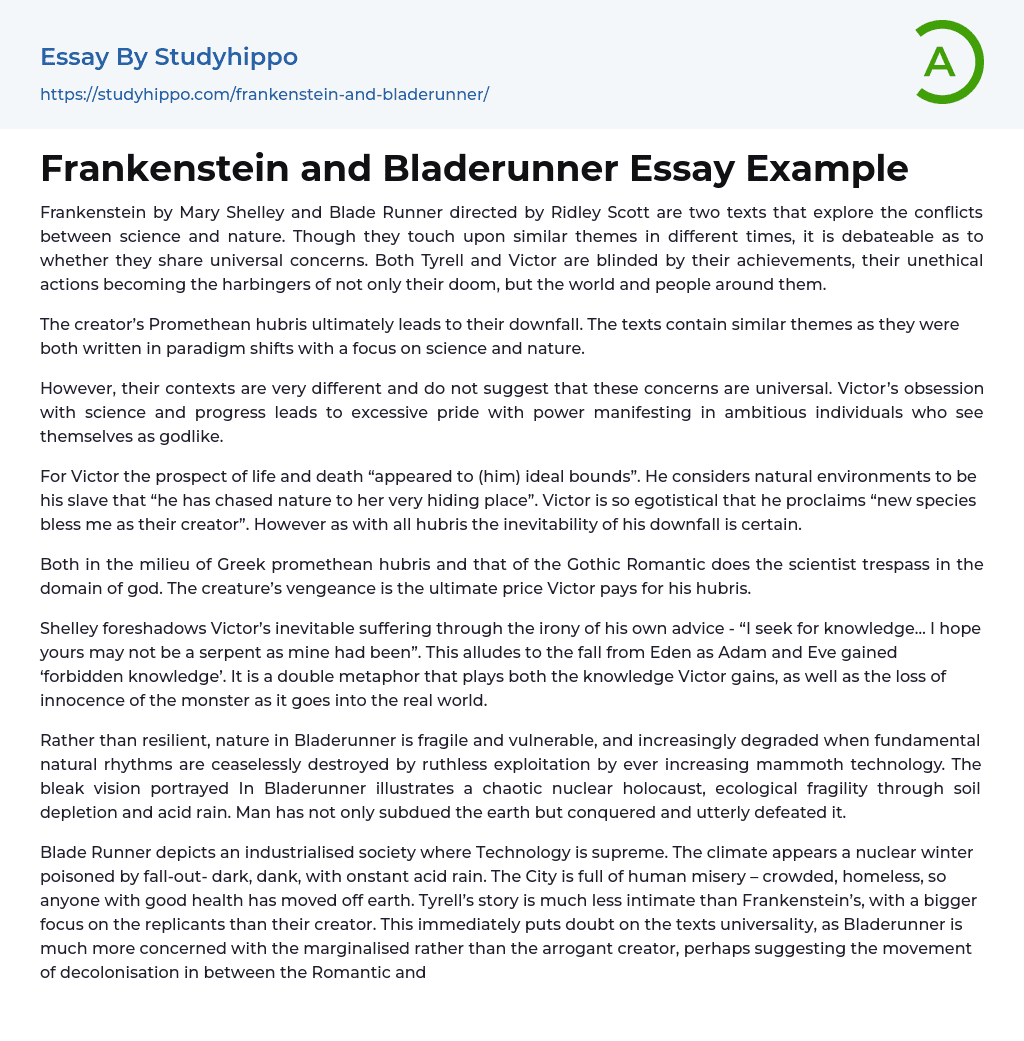Both Mary Shelley's Frankenstein and Ridley Scott's Blade Runner delve into the discord between science and nature. Despite resembling each other in theme, it can be argued whether or not their worries are universal. Both Tyrell and Victor become blinded by their successes, resulting in unethical behavior that spells ruin not just for themselves but those around them. The imprudent hubris of the creator ultimately leads to their downfall. The similar themes in both texts can be traced back to the time in which they were written, where there was a focus on science and nature that initiated a paradigm shift. Nonetheless, the varying contexts of these texts suggest that these worries are not universal. Victor's obsession with science and progress led to insatiable pride with power, fueling a god-like morality that is reminiscent of
...Greek Promethean hubris. To Victor, life and death seemed like boundaries that only he could define, and he saw natural environments as something to be tamed. His ego knew no bounds when he stated that "new species bless me as their creator." As with any type of hubris, his downfall was inexorable. In both the milieu of Greek Promethean hubris and that of Gothic Romanticism, the scientist's meddling in God's domain has dire consequences. In the end, Victor pays the ultimate price for his hubris through the creature's vengeance.By using irony in Victor’s own advice, Shelley foreshadows his inevitable suffering, referencing the fall from Eden as Adam and Eve gained forbidden knowledge. This double metaphor not only applies to the knowledge Victor gains but also to the loss of innocence of the monster as it enters the real world. I
contrast to the resilient nature in Frankenstein, nature in Blade Runner is depicted as fragile and vulnerable, degraded by ruthless exploitation by mammoth technology and resulting in ecological fragility through soil depletion and acid rain. The bleak vision portrayed in Blade Runner illustrates an industrialized society where technology reigns supreme and man has conquered and defeated the earth. With a bigger focus on the replicants than their creator, Tyrell’s story is less intimate than Frankenstein’s, suggesting the movement of decolonization between the Romantic and post-modern contexts, and questioning the text’s universality. The city in Blade Runner is full of human misery, with constant acid rain falling on a climate that appears to be a nuclear winter poisoned by fallout - dark and dank. Those with good health have left Earth because of this, leaving only crowded homeless populations struggling to survive.The texts of Frankenstein and Bladerunner both serve as warnings about the potential threat that Science poses to humanity. Both Frankenstein and Tyrell push the boundaries of human understanding, ultimately facing consequences for their actions. Shelley draws comparisons between Walton's exploration and Frankenstein's search for knowledge, highlighting the desire to make progress and surpass limitations. The overarching theme is that scientific pursuits and excessive rationalism can result in a loss of humanity. Furthermore, both texts depict a loss of control over man-made creations. Though they share similarities, it is important to note that their contexts prevent them from being classified as universally applicable.
- Animals essays
- Charles Darwin essays
- Agriculture essays
- Archaeology essays
- Moon essays
- Space Exploration essays
- Sun essays
- Universe essays
- Birds essays
- Horse essays
- Bear essays
- Butterfly essays
- Cat essays
- Dolphin essays
- Monkey essays
- Tiger essays
- Whale essays
- Lion essays
- Elephant essays
- Mythology essays
- Time Travel essays
- Discovery essays
- Thomas Edison essays
- Linguistics essays
- Journal essays
- Chemistry essays
- Biology essays
- Physics essays
- Seismology essays
- Reaction Rate essays
- Roman Numerals essays
- Scientific Method essays
- Mineralogy essays
- Plate Tectonics essays
- Logic essays
- Genetics essays
- Albert einstein essays
- Stars essays
- Venus essays
- Mars essays
- Evolution essays
- Human Evolution essays
- Noam Chomsky essays
- Methodology essays
- Eli Whitney essays
- Fish essays
- Dinosaur essays
- Isaac Newton essays
- Progress essays
- Scientist essays




